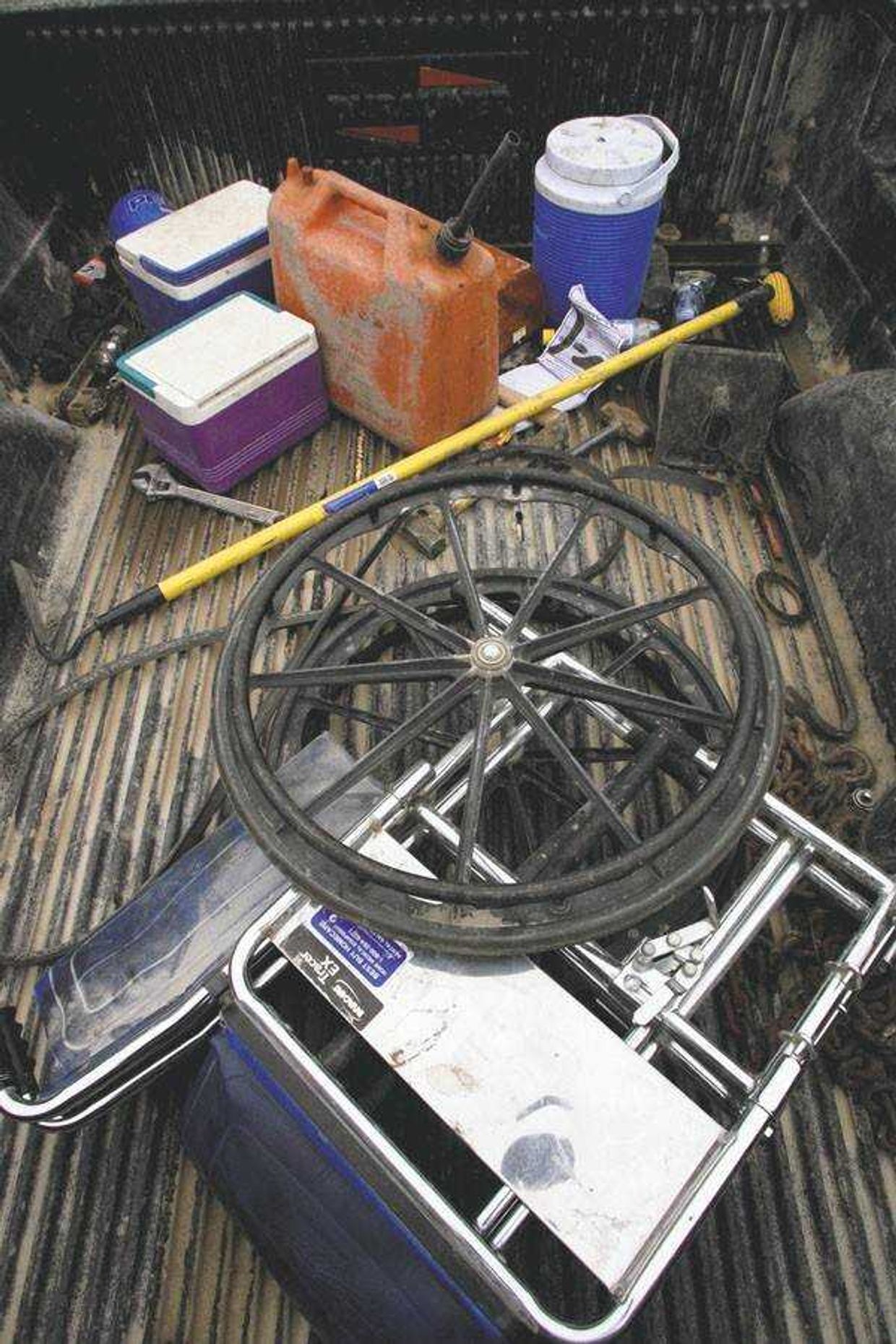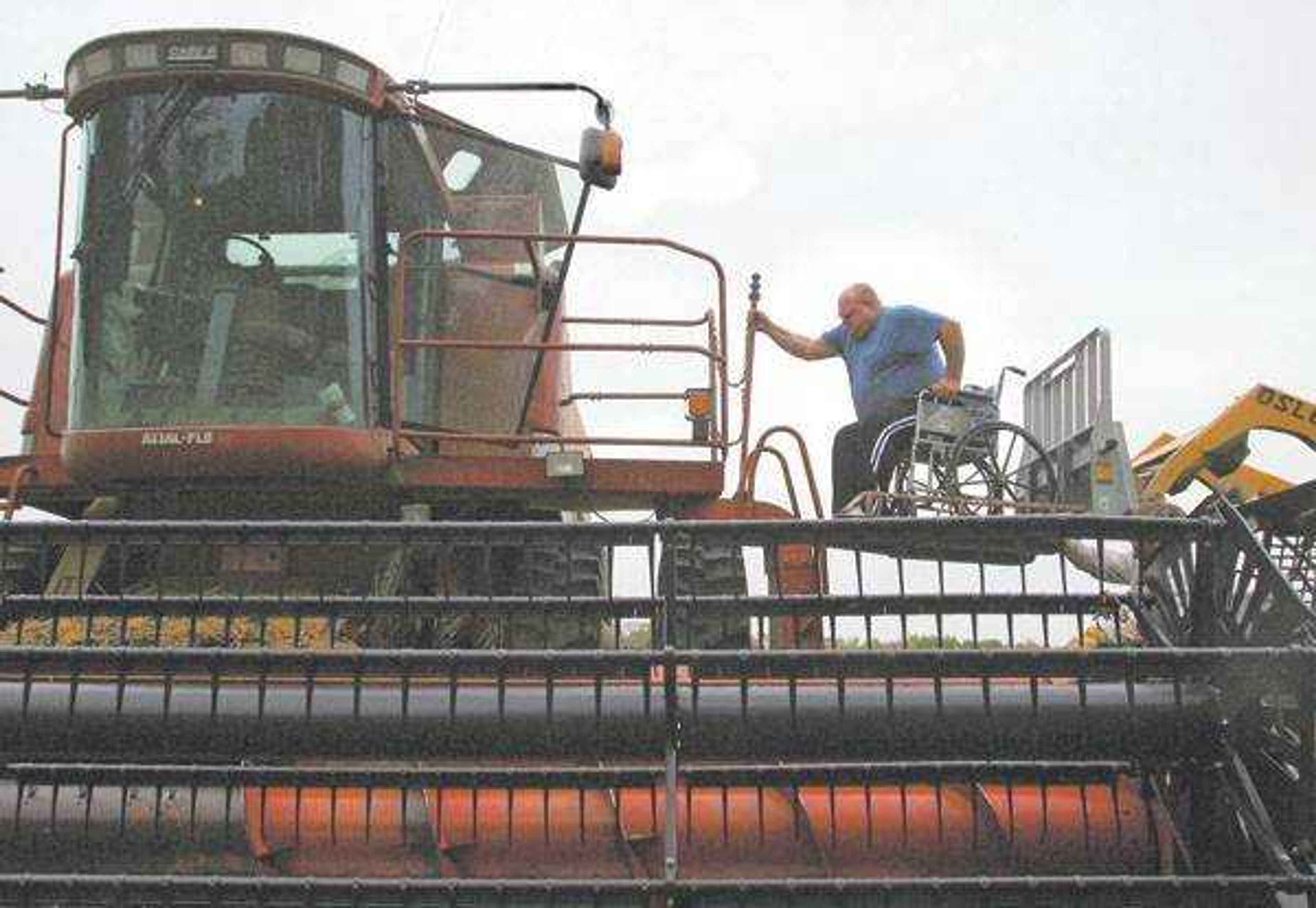Can-do attitudes: Disabilities not stopping Missouri farmers
NEW LONDON, Mo. -- In April 2005, Andy Leake was repairing a tractor when he slipped and fell flat on his back on a concrete slab. Two days later, when he leaned over to pick up a 50-pound bag of seed corn, his life changed. "I was in agonizing pain. It was terrible," said Leake, who uses a powered wheelchair as he runs a family farm of 2,800 acres in Ralls County, about 100 miles northwest of St. Louis. "I had pain across my chest. It was like a belt, all the way around."...
NEW LONDON, Mo. -- In April 2005, Andy Leake was repairing a tractor when he slipped and fell flat on his back on a concrete slab.
Two days later, when he leaned over to pick up a 50-pound bag of seed corn, his life changed.
"I was in agonizing pain. It was terrible," said Leake, who uses a powered wheelchair as he runs a family farm of 2,800 acres in Ralls County, about 100 miles northwest of St. Louis. "I had pain across my chest. It was like a belt, all the way around."
Tests at a hospital in Columbia showed that Leake had broken several thoracic vertebrae. In surgery, doctors fused six. Leake also has diabetes and requires daily insulin shots.

Today during the corn and soybean harvests, Leake likes to operate a combine, although he must use a skid loader to elevate him to the machine's cab and lower him to the ground.
"Basically, I'm proving I can do it," Leake said, echoing the can-do attitude common among disabled farmers, regardless of their injuries. "I could stay in the house doing my book work, but to keep my sanity, I've got to run some machinery."
Farming is the most dangerous profession in America on a per-capita basis, according to federal data. The Missouri Department of Agriculture says on its Web site that more than 700 farmers and ranchers die each year in farm accidents nationwide.
Unlike the two other most-dangerous occupations, mining and construction, farming is virtually unregulated. Most farmers are independent businessmen and women who reject what they view as the "nanny" role of government.
"I just want to make it on my own," said Barkley Pritchett, 52, also from Ralls County. Years ago, he crushed several vertebrae when he fell from a hay wagon. Six months later, he was back on a combine.
Recently, he was working alone, cutting trees with a chain saw, when an 8-inch branch hit him in the right hip, then slid down his leg, breaking his knee and ankle.
"It was kind of tough," said Pritchett, who has returned to farming full time using a leg brace. After the limb hit his leg, he crawled to an all-terrain vehicle, then went to his pickup and drove himself home. His wife took him to the hospital in Hannibal, about 20 miles away.
Fewer than 2 million people nationwide are involved in agriculture, raising and harvesting crops and caring for livestock. Farmers and farm workers operate dangerous equipment, often alone and in remote areas far from hospitals or emergency aid. Many implements are big, quick and dangerous. Sleeves, shirttails and pant cuffs can get caught in the moving parts and pull a farmer into the deadly machinery.
Farmers sometimes take unnecessary risks as they try to save time and get work done while outdoor conditions are favorable.
Average of 110 killed each year
According to the National Institute for Occupational Safety and Health, an average of 110 farm workers nationwide were killed each year between 1992 and 2000 in tractor rollovers, even though manufacturers equip their new machines with roll bars and seat belts. Older tractors may lack seat belts, but even on the newer equipment many farmers will not use them, safety experts say.
"Over 60 percent of the tractors in Missouri do not have rollover protective structures," said David Baker, assistant dean of University of Missouri's Extension Service and an expert on the dangers of farming. "We don't put a value on the person in the seat. We put a value on the hardware."
Karen Funkenbusch, rural safety and health expert with University of Missouri Extension, said the way to change the sometimes-careless habits of farmers is to convince them that they could incur huge costs if they are injured.
"I sell it to them in business terms," she said. "If they do not take care of their health and safety, if they get hurt, who will help them put out their crops? Who will help them with their dairy cows? Who will help them run their farm, their business?"
Funkenbusch believes all the education efforts to make farmers and their families aware of the dangers haven't made farming much safer.
"We keep doing it, but people are not changing their behavior," Funkenbusch said.
"The equipment is engineered to be good. It's the people who take off the guards" covering belts, chains and other fast-moving parts, she said, noting that some farmers follow the same principle as drivers who disable air bags or refuse to use seat belts.
When Leake was recovering from his fall and the subsequent surgery, he was referred to Brad Marsh of Columbia, a coordinator who works with the AgrAbility Project, a 16-year-old federal program that helps injured farmers get back to work.
With Marsh's help, Leake was able to get a Kubota ATV that helps him get around his farm and to install automatic doors on his grain truck that he could control from the cab.
Leake estimated that his hospital and recovery bills totaled $100,000, but AgrAbility helped only with devices to help him return to farming.
He said he paid the health costs himself.
Marsh said farmers, as independent businesspeople, aren't getting special treatment from AgrAbility. Other high-risk professions have vocational-rehabilitation programs, while anyone connected to agriculture who becomes disabled, regardless of the cause, can tap into AgrAbility staff expertise and funds.
"My job is to assist people who want to keep working in agriculture," Marsh said. "We want to help them in their homes and in their communities."
One such injured farm worker is Darrell Fick, 33, a heavy-equipment operator whose family owns and farms about 2,400 acres in St. Louis and Montgomery counties. A pickup accident left Fick paralyzed below the midchest.
Before Fick was injured, he drove tractors, combines and other equipment with his three brothers. Today, thanks to help from AgrAbility, he can drive a specially equipped Ford F-350 flatbed pickup to a construction site, where he uses an electric-powered lift to move himself into the cab of a piece of heavy equipment. Ten days ago, he was running an excavator at a cement plant in Wildwood.
"I am back at work because of the help from friends and family," Fick said. "I'm lucky to be working. My employer told me he'd take me back. He said he didn't think there'd be any major issues."
That ability to return to work is the key goal of AgrAbility and the state's vocational-rehab program, said Sadye Gartland, who worked with Fick to help him get the lift on his truck, a wheelchair and modifications to his car so he could return to work.
Gartland said injured workers who want to be productive again are a gain for the state, which may have spent many thousands of dollars equipping their homes and job sites.
"If they're paying taxes, they're getting back into the system," she said. "The long-term benefits outweigh the costs."
Gartland knows of only one company that makes custom equipment for disabled farmers -- Life Essentials, a husband-and-wife-owned operation in Brookston, Ind.
Hubert Von Holten, 68, paralyzed by polio when he was 5, and Kathy Smith cater to injured people with farm ties like Fick. Sometimes they will custom-make a lift for a truck at their company headquarters, as they did for Fick.
Sometimes they go to a farm to design and make the equipment to lift a farmer into his tractor or combine. "Most farmers, if they are motivated, you give them the tools to work and they'll do it," said Von Holten.
"And their wives, they get a big smile on their face when they see (their husbands) can be back out in the barnyard. He's not going to be around the house anymore."
Connect with the Southeast Missourian Newsroom:
For corrections to this story or other insights for the editor, click here. To submit a letter to the editor, click here. To learn about the Southeast Missourian’s AI Policy, click here.






